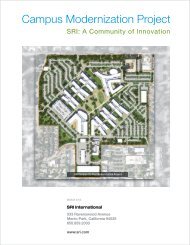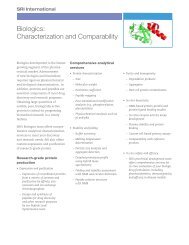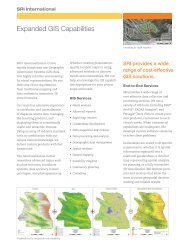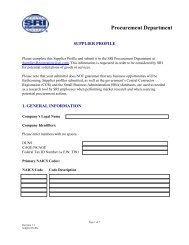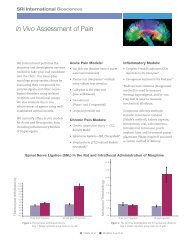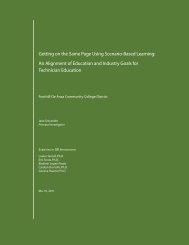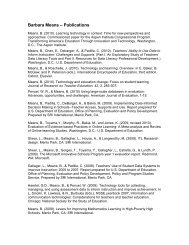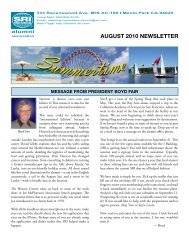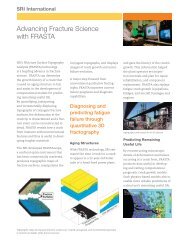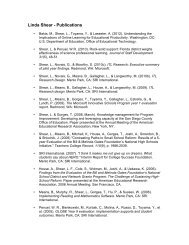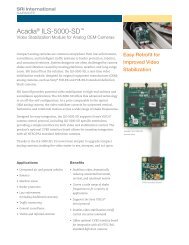Promoting Grit, Tenacity, and Perseverance - U.S. Department of ...
Promoting Grit, Tenacity, and Perseverance - U.S. Department of ...
Promoting Grit, Tenacity, and Perseverance - U.S. Department of ...
Create successful ePaper yourself
Turn your PDF publications into a flip-book with our unique Google optimized e-Paper software.
Draft<br />
Limitations include short school periods with broad coverage <strong>of</strong> st<strong>and</strong>ards, lack <strong>of</strong> teacher<br />
training, lack <strong>of</strong> time for teachers to plan <strong>and</strong> collaborate, <strong>and</strong> lack <strong>of</strong> parental support.<br />
Recommendation 4: Administrators, federal agencies, <strong>and</strong> foundations should provide<br />
structural supports that will enable educators to enact best practices <strong>and</strong> implementation <strong>of</strong><br />
productive models. Administrators <strong>and</strong> educators need pr<strong>of</strong>essional development, curriculum<br />
materials, <strong>and</strong> technological supports. Other potentially high-leverage strategies may be<br />
restructuring school days to have longer periods <strong>and</strong> increasing school staffing so that teachers<br />
can give individual students more thoughtful feedback <strong>and</strong> attention. Outreach <strong>and</strong> inclusion <strong>of</strong><br />
parents <strong>and</strong> other community members also can provide important bridges to promote<br />
coherence among schools <strong>and</strong> local communities.<br />
We also identified a need to raise awareness <strong>of</strong> the importance <strong>of</strong> these competencies across<br />
communities. While “grit” is a “hot” topic in many circles, some <strong>of</strong> these ideas are still<br />
unavailable to the majority <strong>of</strong> individuals in educational communities around the country. To<br />
build the momentum to overcome many <strong>of</strong> the barriers to implementation, a first priority must be<br />
awareness-raising so that teachers, administrators, parents, policymakers, <strong>and</strong> all others involved<br />
in the educational community see these issues as important <strong>and</strong> become invested in supporting<br />
change. Stakeholders who underst<strong>and</strong> the importance <strong>of</strong> these issues <strong>and</strong> are passionate about<br />
shifting educational priorities, within their own institutions <strong>and</strong> beyond, need to become<br />
proactive advocates for change. It is important to realize the potential impacts <strong>of</strong> spreading the<br />
word <strong>and</strong> outreach to the community—to gain buy-in, tangible help <strong>and</strong> support for students as<br />
they pursue big goals, financial resources, <strong>and</strong> political support.<br />
Also, researchers <strong>of</strong>ten have extensive knowledge about what works <strong>and</strong> does not work in<br />
schools, <strong>and</strong> it is the research community’s responsibility to translate these findings so that the<br />
public can underst<strong>and</strong> them, recognize their importance, <strong>and</strong> marshal the resources for change.<br />
Anderman (2011) presents 10 strategies for how researchers can engage with the broader<br />
community:<br />
(1) Present research to practitioners via workshops. (2) Provide assistance to a local<br />
superintendent. (3) Write an applied article for practitioner-oriented journal. (4) Inform<br />
the public relations <strong>of</strong>fice at your institution about your area <strong>of</strong> expertise. (5) Work<br />
collaboratively with teacher educators. (6) Advocate for principles <strong>of</strong> educational<br />
psychology in teacher-intern programs. (7) Inform legislators <strong>of</strong> your research. (8) Talk<br />
about your research conversationally with others—in person <strong>and</strong> via social media. (9)<br />
Work with APA, AERA, <strong>and</strong> other organizations to influence accreditation st<strong>and</strong>ards<br />
(NCATA, TEAC), certification st<strong>and</strong>ards, <strong>and</strong> government policy. (10) Present research<br />
findings at practitioner-oriented conferences (p. 188).<br />
85



